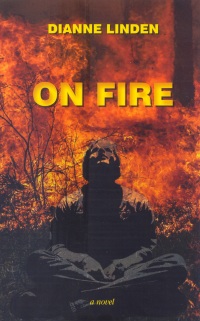| ________________
CM . . .
. Volume XIX Number 41. . . .June 21, 2013
Fourteen-year-old Matti Iverly's small village is overcome by forest fires. She stays behind in her untouched family home with minimal supervision provided by her father's friend, Marsh Dunegan, and a retired teacher, Mrs. Stoa, while her father, Frank, is off fighting the fire. Then a disoriented young man stumbles out of the surrounding wilderness, and Matti takes it upon herself to help him get well. "Dan", as she calls him, can't recall who he is or why he's on the mountain. As Matti and Mrs. Stoa are evacuated to the nearby town of Kingman when the fire sweeps closer, Dan takes off for a deserted native village, led there by a local guide, Virgil. Later, in a psychotic state, Dan is rescued and taken to Metal Springs, the local mental health hospital, where Matti and her father Frank visit him and attempt to identify him by matching his fingerprints to a database. Except that the fingerprints they use are those of another patient, Howard, whom they also befriend. Through medication and rest, Dan slowly recovers enough to come to work for the village cleaning up the fire debris. Matti has the strong, self-deprecating voice of the bright loner that will amuse students. She has Tourette's Syndrome, and her methods of coping with her tics and hand movements, not to mention her intelligence and her fierce determination, will earn their admiration. Matti seems much younger than fourteen, not knowing, for example, what a cheerleader is, and being unaware of the ramifications of some of the social situations in which she finds herself. She thinks she can look after Dan by herself, for example. Dan's behaviour as a person with schizo-affective disorder is bang-on, from the age of onset (late adolescence) to the auditory and visual hallucinations, the hand trembling resulting from the drug Haldol, the fuzzy thought processes, and the gradual recovery of his memory. Haldol is an older anti-psychotic drug not used as much now as it was twenty-five years ago; one of the newer atypical anti-psychotic drugs would have been a better example to employ. All the characters are sympathetic towards the mentally ill; there is no overt discrimination. Secondary characters, like Mrs. Stoa, Marsh, Virgil and Frank, are quirky individuals who are very supportive of Matti, respecting her personality and her disability. Her father is gentle and kind, supportive and helpful in Matti's search for Dan's past. Mrs. Stoa's sharp, witty tongue will amuse the intended reader, but her references to Dante (and the author's naming of the characters Virgil and Beatrice) will go right over their heads. Marsh, who answers many of Matti's day-to-day questions, is firm and patient in spite of his own past mental health issues, letting Matti have just enough rope to develop her social conscience but not allowing her to come into any real danger. Virgil plays the role of the handsome, easy-going, irresponsible guide without a care in the world. The story alternates between Matti's first person narrative and Dan's story told in the third person, and then later as he is recovering in the first person. The first person accounts allow both Matti and Dan to expose their internal thoughts while the third person section highlights Dan's experience on Cato Island with Virgil and his relatives. The dialogue rings true – sharp and witty – while it advance the plot. Only in the last section, as Matti and her father look for Dan's identity and Dan slowly gets better, does the action lag. The mystery of to whom the fingerprints belong isn't enough to hold the reader's interest, but Dan and Matti's reunion with Howard is a joyful, satisfying ending. Recommended. Joan Marshall is a Winnipeg, MB, bookseller.
To comment
on this title or this review, send mail to cm@umanitoba.ca.
Copyright © the Manitoba Library Association. Reproduction for personal
use is permitted only if this copyright notice is maintained. Any
other reproduction is prohibited without permission.
NEXT REVIEW |
TABLE OF CONTENTS FOR THIS ISSUE
- June 21, 2013.
AUTHORS |
TITLES |
MEDIA REVIEWS |
PROFILES |
BACK ISSUES |
SEARCH |
CMARCHIVE |
HOME |
